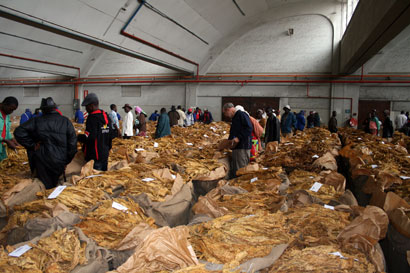High Tobacco Auction Rejection Rate
- Featured Leaf Markets News This Week
- March 23, 2023
- 0
- 2 minutes read

Inspecting tobacco in Zimbabwe

The rate of rejection at Zimbabwe’s tobacco auction floors is 60.78 percent higher this year than it was during the same time last year, according to Tobacco Industry and Marketing Board (TIMB) statistics, reports The Herald.
“Generally, this season has been very difficult to cure good quality leaf, hence the tendency by some small-scale farmers to mix hands and at times moldy leaf, which accounts for about 97 percent of the rejected tobacco,” said Edward Dune, Tobacco Farmers Union Trust vice president. “The remaining small percentage emanates from pricing issues while at contract floors, even defective tobacco bales are accepted.”
The high rejection rate is a cause for concern, according to Zimbabwe Tobacco Growers Association chairman George Seremwe. “We do not rule out the inside job of middlemen (makoronyera) who collude with buyers to reject certain bales for them to be able to rehandle,” he said. “Rehandling charges can be the driving force behind this menace, and this needs to be investigated thoroughly.”
According to Victor Mariranyika, Tobacco Farmers Union Trust president, bale rejection is subjective and can be abused. “At auction floor, there seems to be a syndicate that is using false allegations, a scam that is meant to siphon money from vulnerable farmers.” He said farmers need a clear breakdown of rejection categories to be sure rejections are valid.
TIMB data shows that rejection rates are generally low at contract sales due to contractors’ ability to buy defective bales.
“Tobacco presentation issues (wet or too dry, mixed hands, moldy tobacco, or they are underweight or overweight or contain nontobacco-related material like stones and wood) account for 97 percent of the rejected tobacco, and the balance is for pricing issues,” said Chelesani Tsarwe, TIMB public affairs officer. “To prevent bales from getting rejected, farmers should focus more on grading and presentation from TIMB, contracting companies’ or Agricultural and Rural Development Advisory Services’ agricultural extension officers who are in all tobacco-growing regions.”
